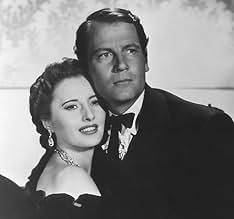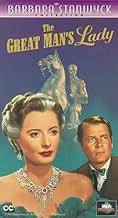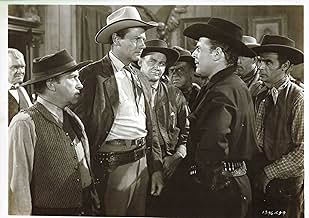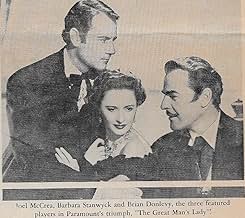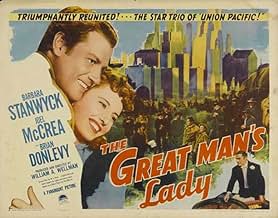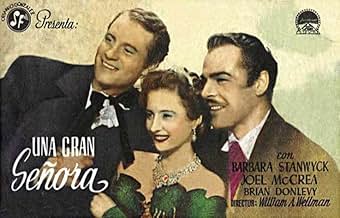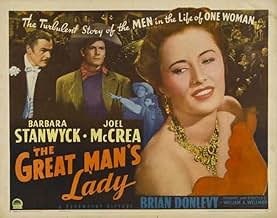A 100-year-old pioneer woman tells her story in flashbacks.A 100-year-old pioneer woman tells her story in flashbacks.A 100-year-old pioneer woman tells her story in flashbacks.
- Awards
- 2 wins total
K.T. Stevens
- Girl Biographer
- (as Katharine Stevens)
Irving Bacon
- Parson
- (uncredited)
Hank Bell
- Man #1 - Hoyt City
- (uncredited)
Monte Blue
- Man #2 - Hoyt City
- (uncredited)
Featured reviews
Joel McCrea and Barbara Stanwyck made six films together, the most they did respectively with other leads. The Great Man's Lady while not the best example of their joint work is certainly one interesting if somewhat incredible film.
I can certainly see what attracted Stanwyck to a role that was part Maytime and part any number of Edna Ferber like tales of empire builders. Stanwyck is certainly a better actress than Jeanette MacDonald and she really does carry off the part of the 107 year old pioneer woman who is telling a young reporter about her most interesting life.
Like in Cimarron, McCrea and Stanwyck start out for the west in the 1840s in search of opportunity and like in Cimarron the woman is being taken from a life of ease and comfort to become a pioneer. The film shows how very useful she was to him.
Albeit even with her conservative politics in real life, Stanwyck was a feminist icon and in the 19th century without even the right to vote, women held a far different position than they do legally now. What help she renders to McCrea is on the unofficial side. But as the story unfolds she contributes mightily to his rise to fame and power and sacrifices EVERYTHING for him.
I'd like to give the film a higher rating, but the thing that totally throws me is the part her father plays in her ultimate decision. Thurston Hall is Stanwyck's father and he's a typical robber baron of the era. But I can't see any father asking his daughter to do what she did for business reasons. It makes the whole story quite bizarre.
McCrea and Stanwyck liked each other personally and professionally. In Tony Thomas's book about Joel McCrea based on interviews he did with him in the Eighties, McCrea said that Barbara Stanwyck was his favorite leading lady. She was thoroughly professional and helpful to every other cast member in any film she was in. He had no qualms in saying that The Great Man's Lady is her film all the way.
It's far from her best film, but for Barbara Stanwyck fans it's one of her best performances.
I can certainly see what attracted Stanwyck to a role that was part Maytime and part any number of Edna Ferber like tales of empire builders. Stanwyck is certainly a better actress than Jeanette MacDonald and she really does carry off the part of the 107 year old pioneer woman who is telling a young reporter about her most interesting life.
Like in Cimarron, McCrea and Stanwyck start out for the west in the 1840s in search of opportunity and like in Cimarron the woman is being taken from a life of ease and comfort to become a pioneer. The film shows how very useful she was to him.
Albeit even with her conservative politics in real life, Stanwyck was a feminist icon and in the 19th century without even the right to vote, women held a far different position than they do legally now. What help she renders to McCrea is on the unofficial side. But as the story unfolds she contributes mightily to his rise to fame and power and sacrifices EVERYTHING for him.
I'd like to give the film a higher rating, but the thing that totally throws me is the part her father plays in her ultimate decision. Thurston Hall is Stanwyck's father and he's a typical robber baron of the era. But I can't see any father asking his daughter to do what she did for business reasons. It makes the whole story quite bizarre.
McCrea and Stanwyck liked each other personally and professionally. In Tony Thomas's book about Joel McCrea based on interviews he did with him in the Eighties, McCrea said that Barbara Stanwyck was his favorite leading lady. She was thoroughly professional and helpful to every other cast member in any film she was in. He had no qualms in saying that The Great Man's Lady is her film all the way.
It's far from her best film, but for Barbara Stanwyck fans it's one of her best performances.
Unfortunately I found this VHS at Video Vault and took it home. All I can say is that even with William A. Wellman directing, Joel McCrea and Barbara Stanwyck acting, Victor Young doing the music and Edith Head the costumes --- each of these people have made pictures ten times better.
Walt Disney's Thumper taught me years ago, "If you can't say nuthin' nice, don't say nuthin' at all." Therefore, I'll note that Great Man's Lady was better than "Shawshank Redemption" which ranks #2 of all time on this website, better than "Order of the Phoenix" whereby Warner's tossed the 750 page story and made a 2 1/2 hour movie with NO story. Please see Wellman's AAA+ "Little Caesar" or McCrea's "4 Faces West" and skip this one.
Walt Disney's Thumper taught me years ago, "If you can't say nuthin' nice, don't say nuthin' at all." Therefore, I'll note that Great Man's Lady was better than "Shawshank Redemption" which ranks #2 of all time on this website, better than "Order of the Phoenix" whereby Warner's tossed the 750 page story and made a 2 1/2 hour movie with NO story. Please see Wellman's AAA+ "Little Caesar" or McCrea's "4 Faces West" and skip this one.
10SHAWFAN
Such undeserved condescension on the part of most of your reviewers! I thought it was an absorbing romantic drama in which Stanwyck was at her very best. As she turned from youthful sparkly-eyed amused flirt in her first scenes with McCrea into the mature more gray-haired woman seriously urging him to do his political best for those whom he represented, her virtuosity as an actress of transformations came greatly to the fore. It was a pleasure to respond to her in her various moods of youthful love, a stunned mother's loss of her two babies, her vigorous denunciation of her father in his unconscionable request of her, and finally the resignation of old age in which she at last destroys the long-lived marriage certificate she's been carrying around through most of the story.
McCrea was also very good, especially in the scene in which he confesses himself guilty of the same kind of corruption so rife in the American West at that railroad-building time.
The story seemed to echo the true events of The Ballad of Baby Doe (opera) in its background of silver mining and marital troubles; and it certainly resembled Edna Ferber-Abby Mann's Cimarron in retelling the story of a marriage in which the husband spends years on the road away from his wife.
The 19th-century flooding in Sacramento was certainly up to date given the similar events happening in that city in our own times as well.
A great movie. Pay no attention to those detractors.
McCrea was also very good, especially in the scene in which he confesses himself guilty of the same kind of corruption so rife in the American West at that railroad-building time.
The story seemed to echo the true events of The Ballad of Baby Doe (opera) in its background of silver mining and marital troubles; and it certainly resembled Edna Ferber-Abby Mann's Cimarron in retelling the story of a marriage in which the husband spends years on the road away from his wife.
The 19th-century flooding in Sacramento was certainly up to date given the similar events happening in that city in our own times as well.
A great movie. Pay no attention to those detractors.
From the first intro scroll itself, the film shows how dated it is and how stupid it can be with the themes in it. The first half hour went along proving it to me with every character and plot point just fast-forwarding itself to seemingly pointless places. But the rest of the movie, even though doesn't really get out of those aspects gives Barbara Stanwyck a great chance to show her acting prowess and she single-handedly saves the film.
The film can be considered an optimistic look at the tragedy that is any human life. But the privilege of the characters, the lack of feeling any stake even when it is needed and the lacklustre narrative doesn't really help in its philosophy. A lot of the movie, especially the scroll at the beginning and the ending sequence feels like the makers believed it to be something epic when it isn't even remotely close to being that.
Even with all of that and some of the regressive messages, the film believes to be progressive, the film still contains enough to appreciate it for what it is. The movie does portray moments that are representative of how small and yet great life is and Barbara Stanwyck makes it work with her charm and presence. I feel like this same exact story could've been a great film with a better script. I don't know how common this type of story was back then but maybe this film has inspired many other filmmakers afterwards.
The film can be considered an optimistic look at the tragedy that is any human life. But the privilege of the characters, the lack of feeling any stake even when it is needed and the lacklustre narrative doesn't really help in its philosophy. A lot of the movie, especially the scroll at the beginning and the ending sequence feels like the makers believed it to be something epic when it isn't even remotely close to being that.
Even with all of that and some of the regressive messages, the film believes to be progressive, the film still contains enough to appreciate it for what it is. The movie does portray moments that are representative of how small and yet great life is and Barbara Stanwyck makes it work with her charm and presence. I feel like this same exact story could've been a great film with a better script. I don't know how common this type of story was back then but maybe this film has inspired many other filmmakers afterwards.
Unfortunately, whatever production values this film contains are generally spoiled by the passage of time and fortunate changes in perspective. For those of us watching now are happily forewarned in the narrator's introduction to the film in which it is not only explicit as to the woman character's subordinate position to her "great man" but also at least implicit as to the role of any woman in the life of her "great man." Of the many "flash-back" films where the character re-hashes their past, this is certainly melodramatic in its acting and characterizations. The action does not seem compelling to watch, as if one could fast-forward to get to the punch line, which does not really satisfy - the principal male character's life is summed up in such high regard as to make one wonder if the viewer had just seen the same film! One has to wonder how female audience members felt about the general message (such as it is) of this film when it opened in theatres, although Ms. Stanwyck most likely held her own in her stubbornness by standards of the time.
Did you know
- TriviaOne of over 700 Paramount productions, filmed between 1929-49, that were sold to MCA/Universal in 1958 for television distribution, and have been owned and controlled by Universal ever since. Its initial television broadcasts took place in Los Angeles Thursday 8 January 1959 on KNXT (Channel 2) and in St. Louis Friday 9 January 1959 on KMOX (Channel 4). In Seattle, it first aired 24 July 1959 on KIRO (Channel 7), in Phoenix 8 August 1959 on KVAR (Channel 12), in Milwaukee 27 September 1959 on WITI (Channel 6), in Pittsburgh 26 October on KDKA (Channel 2), in Detroit 29 October 1959 on WJBK (Channel 2), in Toledo 19 December 1959 on WTOL (Channel 11), in Omaha 22 December 1959 on KETV (Channel 7), in Grand Rapids 27 December 1959 on WOOD (Channel 8), in Chicago 29 December 1959 on WBBM (Channel 2), in New York City 26 March 1960 on WCBS (Channel 2), in Minneapolis 9 November 1960 on WTCN (Channel 11), in Philadelphia 22 December 1962 on WCAU (Channel 10), and in San Francisco 3 February 1963 on KPIX (Channel 5). It was released on DVD 27 April 2010 as one of six titles in Universal's Barbara Stanwyck Collection and on 13 July 2015 as a single as part of the Universal Vault Series; since that time, it's also enjoyed occasional airings on Turner Classic Movies.
- GoofsWhen the Hoyts stand at the sight of their future city, they're at the foot of a hill, but moments later they're on top of a hill.
- ConnectionsFeatured in Biography: Barbara Stanwyck: Straight Down the Line (1997)
- SoundtracksUnfinished Symphony
("Symphony 8 in B Major") (uncredited)
Composed by Franz Schubert (begun 1822)
Heard on soundtrack during Janet and Ethan's farewell and under end title
- How long is The Great Man's Lady?Powered by Alexa
Details
- Runtime
- 1h 30m(90 min)
- Color
- Aspect ratio
- 1.37 : 1
Contribute to this page
Suggest an edit or add missing content

